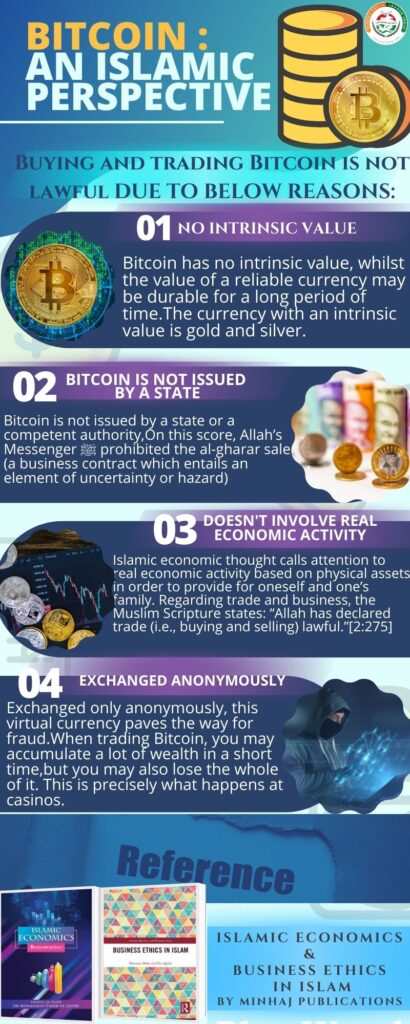One of the hottest contemporary topics in business and trade from both the secular and the Islamic viewpoint has been Bitcoin. Traders in Bitcoin consider themselves lucky as their investments have turned out to be lucrative. If the current trend does not break, multiple rewards are expected from Bitcoin. Due to its huge popularity, many Muslims are enquiring whether Bitcoin complies with Islam.
Buying and trading Bitcoin is not lawful for the following reasons:
1. Bitcoin has no intrinsic value, whilst the value of a reliable currency may be durable for a long period of time. The narrative of the Seven Sleepers of the Cave demonstrates that valuable currency may be used even after 300 years.[Qur’ān 18:19]
The currency with an intrinsic value is gold and silver.[Qur’an 3:14]
2. Bitcoin is not issued by a state or a competent authority, and the overwhelming majority of institutions are still ambivalent about its future. Legally speaking, Bitcoin has no validity. Its uncertain future drives away many people, even ambitious people, because they do not want to gamble away their money. The general public – and even economists – feel that as the value of Bitcoin skyrocketed, it may also fall in the same fashion. This craze may fizzle sooner rather than later. On this score, Allah’s Messenger (Allah bless him and give him peace) prohibited the al-gharar sale(a business contract which entails an element of uncertainty or hazard).[Narrated by al-Tirmidhī in al-Sunan: al-Buyū’ [Sales], Ch.: What has been related about sales of al-gharar (a sale involving uncertainty or deceit) are disliked, 3:532 §1230]
3. No central bank guarantees Bitcoin as a valid currency. Perhaps there may never be one: many people purchase it because of the anonymity of its ownership. The possession of this currency is masked cleverly so that the owner may not pay any tax. Evading taxes is a crime against society and the government.
4. From the Islamic perspective, all those who benefit from state services – for example, as every resident of a state uses public roads – and do not pay taxes are dishonest citizens. By living in a certain country, you actually enter into a contract that you will abide by its laws. Fulfillment of commitments is an obligation, as per the Qur’ān: “O believers! Fulfil (your) promises.” [Qur’ān 5:1]

5. Islamic economic thought calls attention to real economic activity based on physical assets in order to provide for oneself and one’s family. Regarding
trade and business, the Holy Qur’an states: “Allah has declared trade (i.e., buying and selling) lawful.”[2:275]
How can one make money through Bitcoin or any other form of cryptocurrency when they cannot be held in any tangible form?
6. Exchanged only anonymously, this virtual currency paves the way for fraud, corruption and criminal activities. The prohibition of all forms of corruption
stems from the following verse: Always fill up full measure and do not become injurious (to the rights of the people). And weigh with a straight balance. And do not give to the people their things (weighing) less than what is due, nor provoke strife in the land (by such moral, economic and social corruption and fraud).[Chapter 26:181–183]
7. The value of Bitcoin is unstable. Because of its high volatility, cryptocurrencies are not reliable. Some regard Bitcoin’s surge as very turbulent. Islam does not approve of such ambiguity and insecurity in financial matters.[Narrated by al-Tirmidhī in al-Sunan: al-Buyū’ [Sales], Ch.: What has been related about sales of al-gharar (a sale involving uncertainty or deceit) are disliked, 3:532 §1230.]
8. When trading Bitcoin, you may accumulate a lot of wealth in a short time, but you may also lose the whole of it. This is precisely what happens at casinos. On the illegality of gambling, the following verse reads: O believers! Wine and gambling and idols mounted (for worship) and divin arrows (for seeking luck – all) are filthy works of Satan. So turn away from them (completely) so that you may prosper.[Qur’ān 5:90]
Books for Further Reading:-
- Islamic Economics (Shaykh ul Islam Dr. Tahir ul Qadri)
- Business Ethics in Islam ( Dr. Hussain Mohiuddin Qadri)


